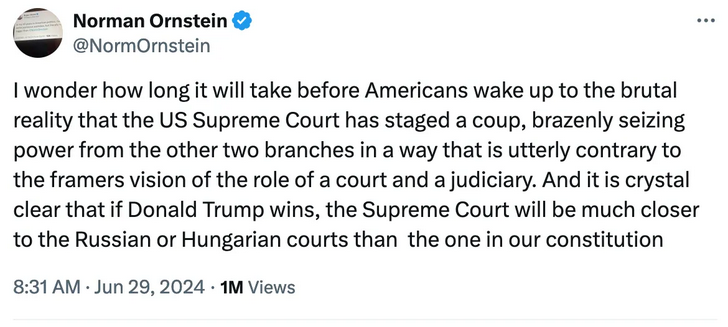On his substack, Glenn “Instapundit” Reynolds discusses the recent US Supreme Court decision on “Chevron deference” and how it is going to impact the administrative state (and their business victims) going forward:
Goodbye, Chevron deference. Larry Tribe is already mourning the Supreme Court’s overturning of NRDC v. Chevron, in the Loper Bright and Relentless cases, as a national catastrophe:
Oh, the humanity!
Well, speaking as a professor of Administrative Law, I think I’ll bear up just fine. I’ve spent the last several years telling my students that Chevron was likely to be reversed soon, and I’m capable of revising my syllabus without too much trauma. It’s on a word processor, you know. As for those academics who have built their careers around the intricacies of Chevron deference, well, now they’ll be able to write about what comes next. And if they’re not up to that task, then it was a bad idea to build a career around a single Supreme Court doctrine.
And that wasn’t the only important Supreme Court decision targeting the administrative state, a situation that has pundit Norm Ornstein, predictable voice of the ruling class’s least thoughtful and most reflexive cohort, making Larry Tribe sound calm.
Sure, Norm, whatever you say.
But how about let’s look at what the Court actually did in Chevron, and in the Loper Bright and Relentless cases that overturned it, and in SEC v Jarkesy, where the Court held that agencies can’t replace trial by jury with their own administrative procedures, and in Garland. v. Cargill, where the Court held that agencies can’t rewrite statutes via their own regulations. I don’t think you’ll find the sort of Russian style power grab that Ornstein describes, but rather a return to constitutional government of the sort that he ought to favor.
At root, Chevron v. Natural Resources Defense Council is about deference. Deference is a partial abdication of decisionmaking in favor of someone else. So, for example, when we go out to dinner, I often order what my son-in-law orders, even if something else on the menu sounds appealing. I’ve learned that somehow he always seems to pick the best thing.
Deference doesn’t mean “I’ve heard your argument and I’m persuaded by it”, (though something like that is misleadingly called “Skidmore deference”, but isn’t actually deference at all). Deference means “even if I would have decided this question differently, I’m going to go with your judgment instead”.
Under Chevron deference, when an agency interprets a statute it administers (e.g., the EPA and the Clean Air Act), a court will uphold its interpretation so long as it is (generously assessed) a reasonable one, even if it is not the interpretation the court would have come up with on its own. As you might imagine, this, at least potentially, gives agencies a lot more leeway, particularly when, as is often the case, Congress has drafted the statute ambiguously.
With Chevron overturned, courts will now apply their own judgment instead of deferring to agencies. Of course, this isn’t as big a deal as Larry and Norm seem to think, because Chevron has been dying the death of a thousand cuts for a while. Under the “major questions doctrine”, courts already decline to defer to agency interpretations where the issue has major social or economic ramifications.





